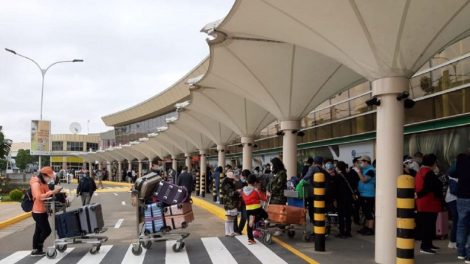On March 5th, 2020 this writer took a flight from Nairobi to Cairo. As usual, the airport in Kenya’s capital, Jomo Kenyatta International Airport, was busy and abuzz with activity; people from different nationalities all hassling to catch a flight to their various destinations.
To have a seamless trip, I arrived at the airport three hours before. My target was to beat the high traffic in an airport that handles more than 200,000 passengers every year. My check in processes took about two hours and after a short wait at the lounge, I was on board an EgyptAir flight to Cairo.
But my trip to the land of the Pharaohs wasn’t like any other. In just three days, the Egyptian government issued an order banning public gatherings and I had to rush out of the country before an impending closure of borders took effect. This time round I arrived at the airport with just one hour to go, and the check in process took less than 15 minutes. The whole experience was starkly different from other travels that I had undertaken before from the same airport, city and country.
This story is similar to many others that passengers who’ve taken flights during the post-COVID era. As the pandemic swept through the continent, the International Air Traffic Association reports that air traffic fell by 69.8% in 2020.
“This time around of course, borders are closed for some of the countries on the continent. This of course, being contextualized in regards to airlines,” Arnold Segawa, a Central Bank scholar and former broadcaster at CNBC Africa, said.

“And to add on from reports we’ve seen from last year, about 3 million jobs were lost. So they’re still operating in losses because of the travel bans that were all over the world, but then it’s even harder to travel because you need a COVID test.”
“I’ve been here just two days and I have had to take a COVID test close to a $100. So the price of traveling plus COVID tests and all of that, and we are not sure about the future, how the future stands,” Dumi Jere, Managing Partner at Talanta.co said.
As airlines struggled, governments in South Africa, Namibia, Kenya and Egypt bailed out the national carriers. Some economists have warned such moves are unsustainable though Segawa differs.
“When it comes to South Africa, there always has been bailout after bailout after bailout. I feel it compare, I think an American company, it sounds like General Motors, which has been bailed by countless presidents over the years.”
A new approach is thus necessary if African airlines are to emerge from the pandemic in healthy conditions. The African Continental Free Trade Agreement (ACFTA) that came into force in January 2021 provides an avenue for airlines to capitalize on what is now the largest single market in the world by offering services across the continent.
“I suppose those are some of the conditions brought on by government quarters, but for the meantime government funding, and of course you’ve alluded to something else that has often come up, maybe just a whole need privatizing some of these airlines or looking for more lucrative partnerships, for instance, the Qatar Airways and Rwandair deal,” said Dumi Jere.
There is hope that the introduction of vaccination campaigns in various African countries may spell hope for the aviation sector. But that depends on the timeliness and speed of such campaigns.
“Africa will stand severe disadvantages, to borrow from the World Health Organization, and moral catastrophe because they will feel very left out of everything that will be happening in the world. So, yeah, blanket vaccination requirements definitely would discriminate against countries that have not received enough vaccines to inoculate enough people on the other hand as well,” said Dumi Jere.
Many analysts predict that airline travel is likely to return to pre-COVID times only in late 2022 or 2024, a timeline that most carriers may struggle to reach while still in business.
“And to add on that I think last year we stated to bounce back but in 2021 that has fallen back because we see even in the West now some countries going back into lockdown,” Maggie Mutesi, a senior business journalist at BBC Africa said.
“So we might have to look at this maybe in 2024, 2023, who knows, but we’re definitely going to have to adapt to the new normal of traveling with passports.”
You can listen to the full podcast on https://theweeklybeatbymansa.buzzsprout.com/1655965/8015347-the-weekly-beat-feb-23-2021

